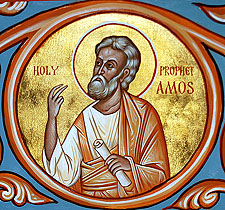|
|||
|---|---|---|---|
| This weekly bulletin insert complements the curriculum published by the Department of Christian Education of the Orthodox Church in America. This and many other Christian Education resources are available at http://dce.oca.org. | |||

The Old Testament prophet Amos lived during the 8th Century BC. The New Testament describes the unexpected, sudden calls of several of the apostles. Two pairs of brothers—Peter and Andrew, then James and John—are going about their daily work of fishing when Jesus Christ calls them with the famous words, "Follow me, and I will make you fishers of men." All of them leave their nets and their daily work at once to go with Him (Matthew 4: 18-20). This sudden call to leave an everyday occupation seems also to have been Amos' experience. He was a shepherd, in a time when many Old Testament prophets came from a professional "class." In II Kings 2:3, 4:38 and 6:1 Elisha encounters the "sons of the prophets" as a group. In I Kings 22:6, the King of Israel gathers "the prophets," about 400 men, and asks them what he should do. In I Samuel 10:5, Saul is told that he will meet "a band of prophets coming down from the high place with harp, tambourine, flute, and lyre before them, prophesying." When Amos describes his call, he makes it clear that he doesn't belong to this special class: "I am no prophet, nor a priest's son" (7:14). Like the fishermen in Jesus' time, his call seems sudden and unexpected. He is "a herdsman, and a dresser of sycamore trees, and the Lord took me from following the flock, and the Lord said to me, 'Go, prophesy to my people Israel'" (7:15). This sudden call was also impossible to ignore: "The lion has roared; who will not fear? The Lord has spoken; who can but prophesy?" (3:5). So Amos travels from his home in Tekoa, south of Bethlehem, to the Northern Kingdom. As soon as he arrives, he understands why God is angry with Israel. He sees that the rich "trample the head of the poor into the earth, and turn aside the way of the afflicted" (2:7), while fathers and sons patronize the same brothels, judges cheat plaintiffs, and women enjoy getting drunk. The people, predictably, don't want to hear Amos' prophecy of punishment. They want to believe that God is pleased with their observances of the liturgical seasons and the sacrifices they offer. But Amos gives them God's word about these things: "I hate, I despise your feasts, and I take no delight in your solemn assemblies...the peace offerings of your fatted beasts I will not look upon" (5:21-22).
Amos also warns them that the "day of the Lord," which they anticipate as a time when God will give them victory over their enemies, will instead be "darkness, and not light" (5:18b). Amos is rudely told to go back to Judah and never preach in the north again. But his hopeful prophecy about God's restoration of David's kingdom and the glorious age to come is quoted in Acts 15:16-17 by the apostle James: "I will rebuild the dwelling of David, which has fallen...that the rest of men may seek the Lord." This prophet of the Old Testament, born a simple shepherd, had prophesied the universal promise that the apostles, those who like him had received a sudden call, would preach to the world. |
|||
